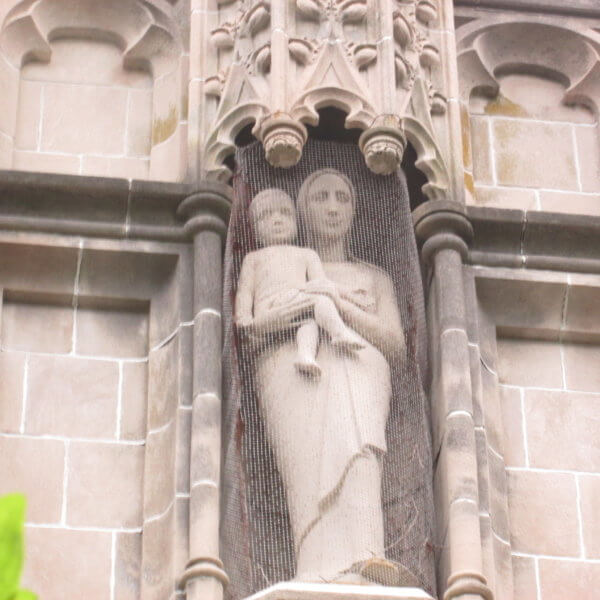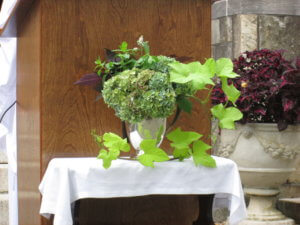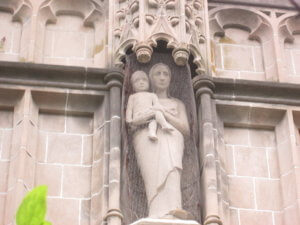
Crossing Borders In Our Hearts
 This week our attention has been really focused on our differences — power differences, economic differences, racial differences, ethnic differences — and climate, political, gender, and religious differences. On the heels of the catastrophic explosion in Beirut, Lebanese protesters are calling for the government to resign after its failure to remove explosives from the port after years of warnings. The State of Israel traded annexation of West Bank territories for diplomatic relations with United Arab Emirates, drawing immediate anger from pretty much everyone. Turkey, Iran, and Palestine — as well as Orthodox Jews in the State of Israel — all denounce the deal, for very different reasons.
This week our attention has been really focused on our differences — power differences, economic differences, racial differences, ethnic differences — and climate, political, gender, and religious differences. On the heels of the catastrophic explosion in Beirut, Lebanese protesters are calling for the government to resign after its failure to remove explosives from the port after years of warnings. The State of Israel traded annexation of West Bank territories for diplomatic relations with United Arab Emirates, drawing immediate anger from pretty much everyone. Turkey, Iran, and Palestine — as well as Orthodox Jews in the State of Israel — all denounce the deal, for very different reasons.
And here in the United States, our presidential candidates are gearing up for the election in 89 days. All the rhetoric of the campaign dialogue emphasizes our differences, rather than forging understanding. And all of this in the context of a global pandemic, where we have to work really hard on our empathy just to communicate with each other through masks and across social distances.
What does this say to us? You may think that this is kind of strange, but I think our current state of polarization — Muslim and Christian Arabs and Israeli Jews; Republican and Democrat; us and them; me and you — gives us special insight into what Jesus is trying to teach
us in today’s reading from Matthew’s gospel. Why, you might ask? Because what so many of us are doing right now — thinking more about how we’re all different than how we’re alike — is exactly the right frame of mind to understand Matthew’s gospel this morning. Jesus is showing the disciples — and all of us, looking over their shoulders, listening in — that it’s true. Yes, we’re all different. Completely so. And yes, sometimes we disagree — by a lot and over really big things. But even as we are different, and want different things — sometimes even directly conflicting things — we are all, EVERY ONE OF US, beloved by God.
We Are All Beloved By God
Remember today’s reading from Isaiah:
Thus says the Lord:
God will make ALL who love God
joyful in God’s house of prayer;
And God’s house shall be called a house of prayer
for all people.
Not just those who live in the same town or even on the same continent. Not just those of us who have lived in the same place for generations, or whose grandmothers made the same Sunday night dinner using the same special ingredients. Not just those of us who speak the same language — or speak the same language the same way. Not just those who look like us, share the same political views, or root for the same baseball team. Not just those who belong to the same church, or worship God in the same way — or live in God’s world but don’t worship God. Nope, God loves all of us — ALL people. Without exception.
At the beginning of today’s reading, Jesus and the disciples are still in the Galilee. Remember that over these past weeks, Jesus has been preaching and teaching around the fishing villages set on that freshwater lake in the Jordan Valley — the salad bowl of the whole region that is now the State of Israel and the West Bank — the Palestinian Territories.
 The Sea of Galilee is in the northern part of the State of Israel — the old kingdom of Judah from the time of the ancient Israelites. Jerusalem is much farther south, in the Kingdom of Israel — just under two hours’ drive today. But the Galilee is Jesus and the disciples’ home country! Where they’re from. Think of how many times in the gospels that Romans, and other Jerusalem Jews, identify Jesus and the disciples as outsiders, calling them “Galileans.” The gospels even mention that they have “accents” — the way they talk back home — that identify them and set them apart when they are in Jerusalem. So the Galilee region is their home place — their old stomping grounds. Context and location are really important here, and I think we really get that, right? Especially now, when the presidential campaigns and our international political circumstances are all so contextual — so particular — to each group of individual people.
The Sea of Galilee is in the northern part of the State of Israel — the old kingdom of Judah from the time of the ancient Israelites. Jerusalem is much farther south, in the Kingdom of Israel — just under two hours’ drive today. But the Galilee is Jesus and the disciples’ home country! Where they’re from. Think of how many times in the gospels that Romans, and other Jerusalem Jews, identify Jesus and the disciples as outsiders, calling them “Galileans.” The gospels even mention that they have “accents” — the way they talk back home — that identify them and set them apart when they are in Jerusalem. So the Galilee region is their home place — their old stomping grounds. Context and location are really important here, and I think we really get that, right? Especially now, when the presidential campaigns and our international political circumstances are all so contextual — so particular — to each group of individual people.
The Pharisees Are Trying to Do the Right Thing
The first part of today’s reading from Matthew takes place in the Galilee, and Jesus is teaching the disciples, as he talks to the Pharisees and Sadducees — who are very likely also Galileans — what really causes a person to be unclean. The Pharisees and Sadducees are not
bad people, and sometimes we get that idea, because they are always challenging Jesus in scripture. They just are trying to keep the Jewish law. They’re trying very hard to follow what they understand, and have been taught, about how to keep God’s covenant. They are people of
the law, and I’m not just defending them just because I’m also a lawyer! They really believe they’re doing the right thing to be good Jews and keep the covenant.
Jesus explains to them, probably right in sight of the Sea of Galilee, what it is that makes a person unclean: it’s not failing to keep the dietary laws, like eating scavengers and bottom feeders. That’s good, right? We’d miss out on lobster and littlenecks! As Jesus points out,
whatever you eat just goes into the stomach and out into the sewer anyway. It’s what comes out of a person’s mouth that makes that person unclean, Jesus explains.
Because what comes out of a person’s mouth comes from the heart: hurtful words, laws or policies that exclude or disadvantage other people, violent or hateful speech. Or, as Jesus says, evil intentions, murder, adultery, fornication, theft, false witness, slander. Those are the bad things that make a person evil, so it’s not a bad thing to worship God by defining yourself in discipline as one who follows certain dietary practices. But, Jesus is saying, your work is not done with that. You have to really think about your words, your thoughts, and your intent. There can be real trouble there if you only focus on what you’re eating.
SO THEN — there’s a complete change of scene. This is really important. Jesus and the disciples leave the Sea of Galilee, where they’re all from, and head north into pagan territory. They head up past the headwaters of the River Jor and the River Dan, which becomes the
Jordan River as they join. They go, Matthew’s gospel tells us, to the district of Tyre and Sidon, today in that northern region of the Golan Heights, into modern Syria and Lebanon.
Canaanites are Different from Galileans
 Tyre and Sidon — that was beyond the pale. WAY out of their home area. And the people there — ESPECIALLY the Canaanite woman who asks Jesus to get the demons out of her daughter — are very different from the Galileans. They didn’t have the same accent, or customs, and they were a pagan culture. But Jesus specifically went there, and their relocation and context are mentioned in today’s reading: Jesus and the disciples THEN WENT TO the districts Tyre and Sidon. And to top it all off, the woman is specifically identified as a Canaanite.
Tyre and Sidon — that was beyond the pale. WAY out of their home area. And the people there — ESPECIALLY the Canaanite woman who asks Jesus to get the demons out of her daughter — are very different from the Galileans. They didn’t have the same accent, or customs, and they were a pagan culture. But Jesus specifically went there, and their relocation and context are mentioned in today’s reading: Jesus and the disciples THEN WENT TO the districts Tyre and Sidon. And to top it all off, the woman is specifically identified as a Canaanite.
She was absolutely not someone that the disciples though Jesus should be talking to. AND she’s yelling to get Jesus’ attention. This surely doesn’t feel polite and proper to the disciples.
And, as Jesus does, he plays out the scene. The Canaanite woman approaches him, and Jesus gives her the legal answer: I was sent only to the lost sheep of the house of Israel. In other words, I’m only here to help the Jews. Then the Canaanite woman — a shouter, as poet and
preacher Peter Hawkins points out — the Canaanite woman came and knelt before him, saying, Lord, help me. Jesus ups the ante to really make the point: He answered, It is not fair to take the children’s food and throw it to the dogs. OUCH! That’s tough.
But the Canaanite woman persists, saying Yes, Lord, yet even the dogs eat the crumbs that fall from their masters’ table. Then Jesus answered her, Woman, great is your faith! Let it be done for you as you wish. And her daughter was healed instantly. Back home, by the Sea of Galilee, the disciples had told Jesus that the Pharisees and Sadducees were offended by what Jesus said about keeping the law, and wanted an explanation of what he meant by his teaching.
As preacher Karoline Lewis says, the Canaanite woman becomes Jesus’ explanation of the parable. Jesus has pointed out all of her differences, even calling her a dog — saying out loud that horrible racial and ethnic slur — what the disciples were probably thinking about someone so different from them daring to ask Jesus for help. And then Jesus praised her faith and healed her daughter, making it clear that it’s what comes out of the mouth, not what goes into it, that defiles us. God loves all of us, every single one of us, right through our differences, and asks us to do that too. Amen
